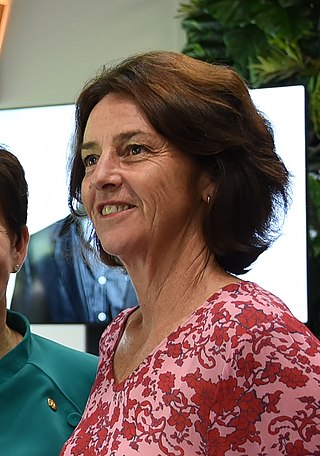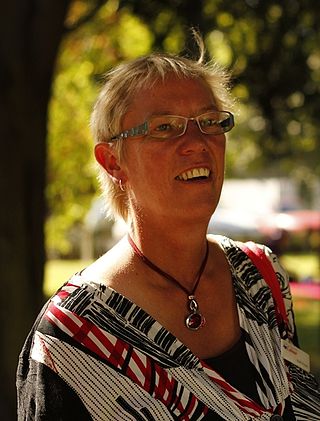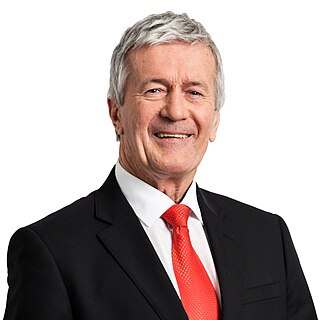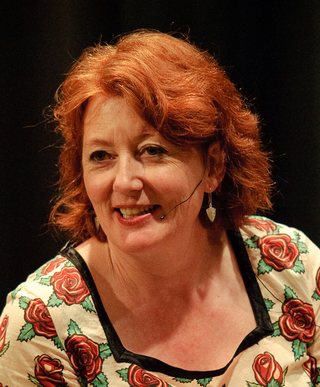Related Research Articles

Sir Michael John Cullen was a New Zealand politician. He served as the 16th deputy prime minister of New Zealand, also as the minister of Finance, minister of Tertiary Education, and attorney-general. He was the deputy leader of the Labour Party from 1996 until November 2008, when he resigned following a defeat in the general election. He resigned from Parliament in April 2009, to become the deputy chairman of New Zealand Post from 1 November 2009 and chairman from 1 November 2010 until leaving the role in 2016. On 6 March 2020 he announced that he had resigned from the Lakes and Bay of Plenty district health boards, respectively. At the same time he also announced that he had been diagnosed with stage 4 small-cell lung cancer, which had also spread to his liver.

Dame Susan Elizabeth Anne Devoy is a New Zealand former squash player and senior public servant. As a squash player, she was dominant in the late 1980s and early 1990s, winning the World Open on four occasions. She served as New Zealand's Race Relations Commissioner from 2013 to 2018.

Jeanette Mary Fitzsimons was a New Zealand politician and environmentalist. She was the co-leader of the Green Party of Aotearoa New Zealand from 1995 to 2009, and was a Member of Parliament from 1996 to 2010.

Sir Trevor Colin Mallard is a New Zealand politician. He currently serves as Ambassador of New Zealand to Ireland since 2023. He was a Member of Parliament from 1984 to 1990 and again from 1993 to 2022. He served as Speaker of the New Zealand House of Representatives from 2017 until 2022.

John Henry Tamihere is a New Zealand politician, media personality, and political commentator. He was member of Parliament from 1999 to 2005, including serving as a Cabinet minister in the Labour Party from August 2002 to November 2004. Tamihere ran unsuccessfully for Auckland mayor in the 2019 election. He joined the Māori Party in 2020 and from April to October 2020 was the party's co-leader. He became president of the Māori Party in June 2022.

Richard John Barker is a New Zealand politician. He is a member of the Labour Party, and was a middle-ranking Cabinet minister in the Fifth Labour Government of New Zealand.

Ruth Suzanne Dyson is a former New Zealand politician. She was a Labour Party Member of Parliament from 1993 to 2020. She represented the Port Hills electorate from the 2008 election election to 2020. She also held a number of senior offices in the Labour Party, including president.

Richard Westwood Worth was a New Zealand politician of the New Zealand National Party. He was the Member of Parliament for Epsom from 1999 to 2005 and a list MP from 2005 to 2009.

Damien Peter O'Connor is a New Zealand Labour Party politician who served as Minister of Agriculture, Minister for Biosecurity, Minister for Trade and Export Growth, Minister for Land Information and Minister for Rural Communities in the Sixth Labour Government. He previously served as a cabinet minister in the Fifth Labour Government. He had been a member of Parliament since 1993 and represented the West Coast-Tasman electorate. He is now on the Labour list.

Anne Merrilyn Tolley is a New Zealand politician.

Peter Byard Davis is a New Zealand sociologist, professor, and the husband of Helen Clark, who was the Prime Minister of New Zealand from 1999 to 2008.

Dame Frances Helen Wilde is a New Zealand politician, and former Wellington Labour member of parliament, Minister of Tourism and Mayor of Wellington. She was the first woman to serve as Mayor of Wellington. She was chairperson of the Greater Wellington Regional Council from 2007 until 2015, and since 2019 she has chaired the board of the Museum of New Zealand Te Papa Tongarewa.

Grant Murray Robertson is a retired New Zealand politician and member of the Labour Party who served as the Minister of Finance from 2017 to 2023, as Minister of Foreign Affairs in November 2023, and as the 19th Deputy Prime Minister of New Zealand from 2020 to 2023. He was the member of Parliament (MP) for Wellington Central from 2008 to 2023.

Heretaunga is a former New Zealand parliamentary electorate, in the city of Upper Hutt, that existed from 1954 until 1996.

Helen Elizabeth Clark is a New Zealand politician who served as the 37th prime minister of New Zealand from 1999 to 2008, and was the administrator of the United Nations Development Programme from 2009 to 2017. She was New Zealand's fifth-longest-serving prime minister, and the second woman to hold that office.

David Scott Clark is a former New Zealand Labour Party politician.

Margaret Mary Barry, generally known as Maggie Barry, is a New Zealand radio and television presenter and politician.

Andrew Kirton is a New Zealand business executive, lobbyist and politician. He was general secretary of the New Zealand Labour Party from 2016 to 2018, campaign manager for the Labour Party in the 2017 general election, and chief of staff to prime minister Chris Hipkins in 2023.
The 2020 New Zealand general election held on Saturday, 17 October 2020 determined the membership of the 53rd New Zealand Parliament. It was previously scheduled for 19 September, before being delayed due to the COVID-19 pandemic. Parliament has 120 seats, and 72 will be filled by electorate MPs, with the remaining 48 from ranked party lists. Parties were required to submit their party lists to the Electoral Commission by 17 September and the lists were publicly released on 19 September, though some parties published their lists earlier than that. This page lists candidates by party, including their ranking on a list.
References
- Parussini, Peter (2020). Believer: Conversations with Mike Moore. Auckland: Upstart Press. ISBN 978-1-990003-04-2.